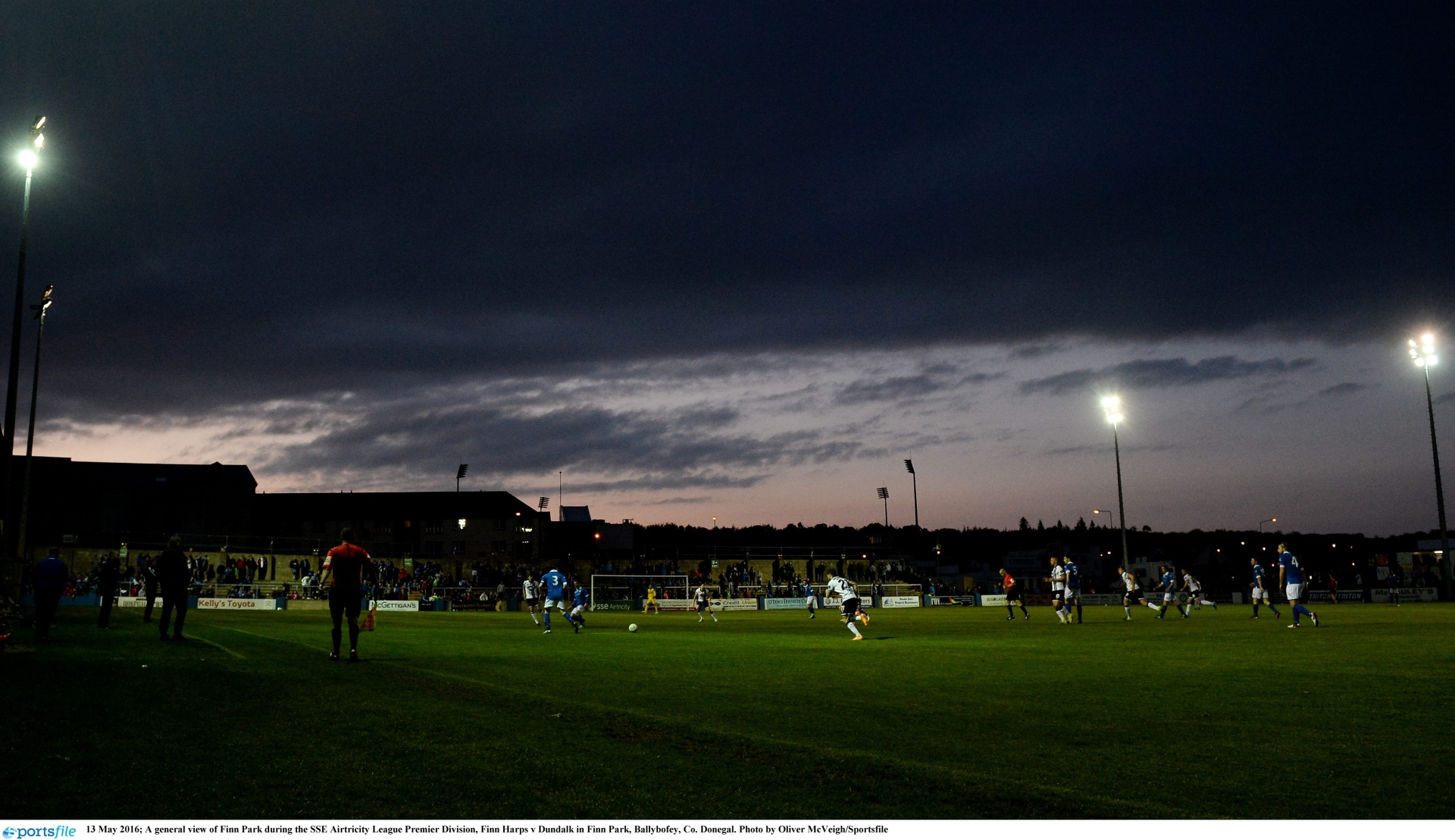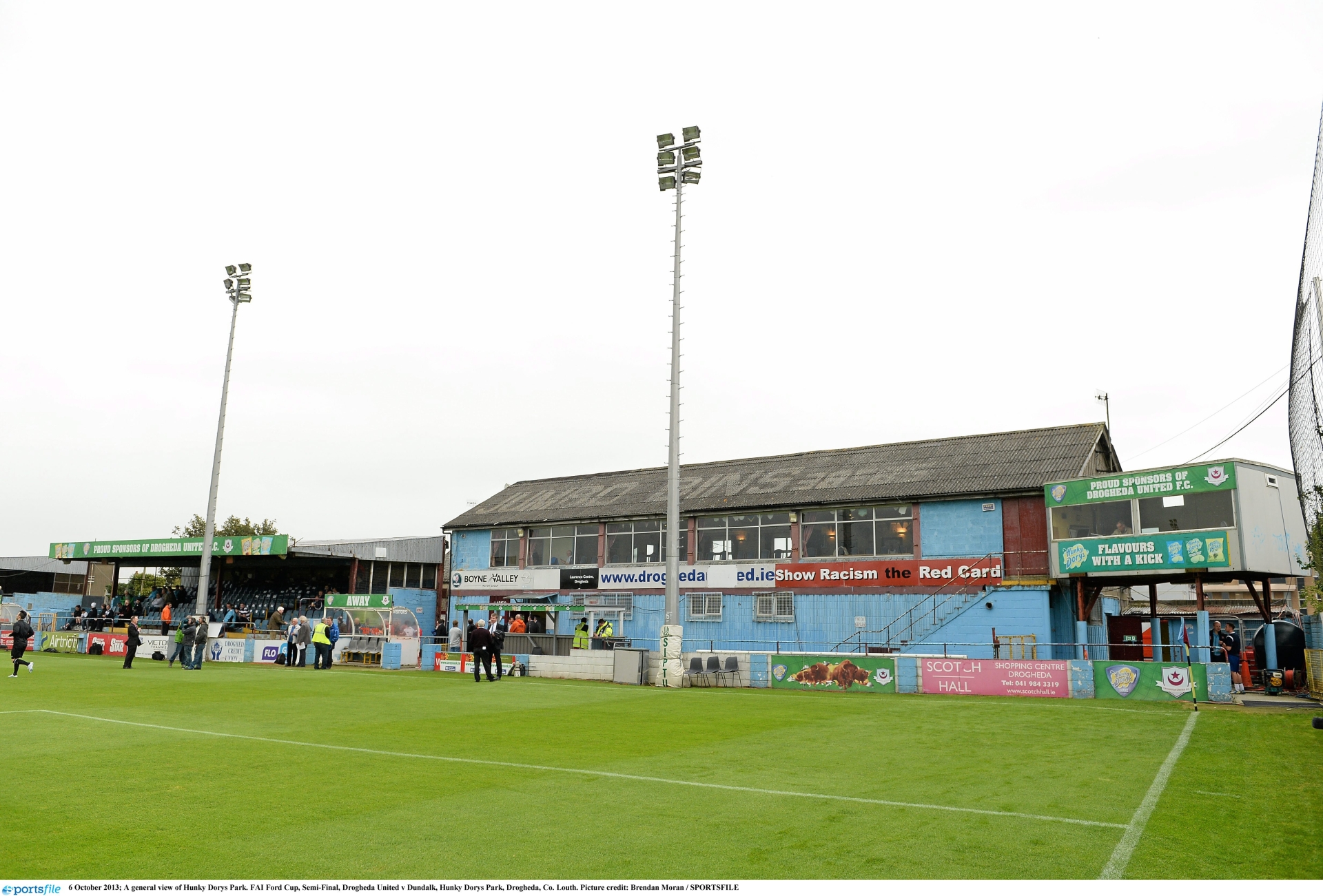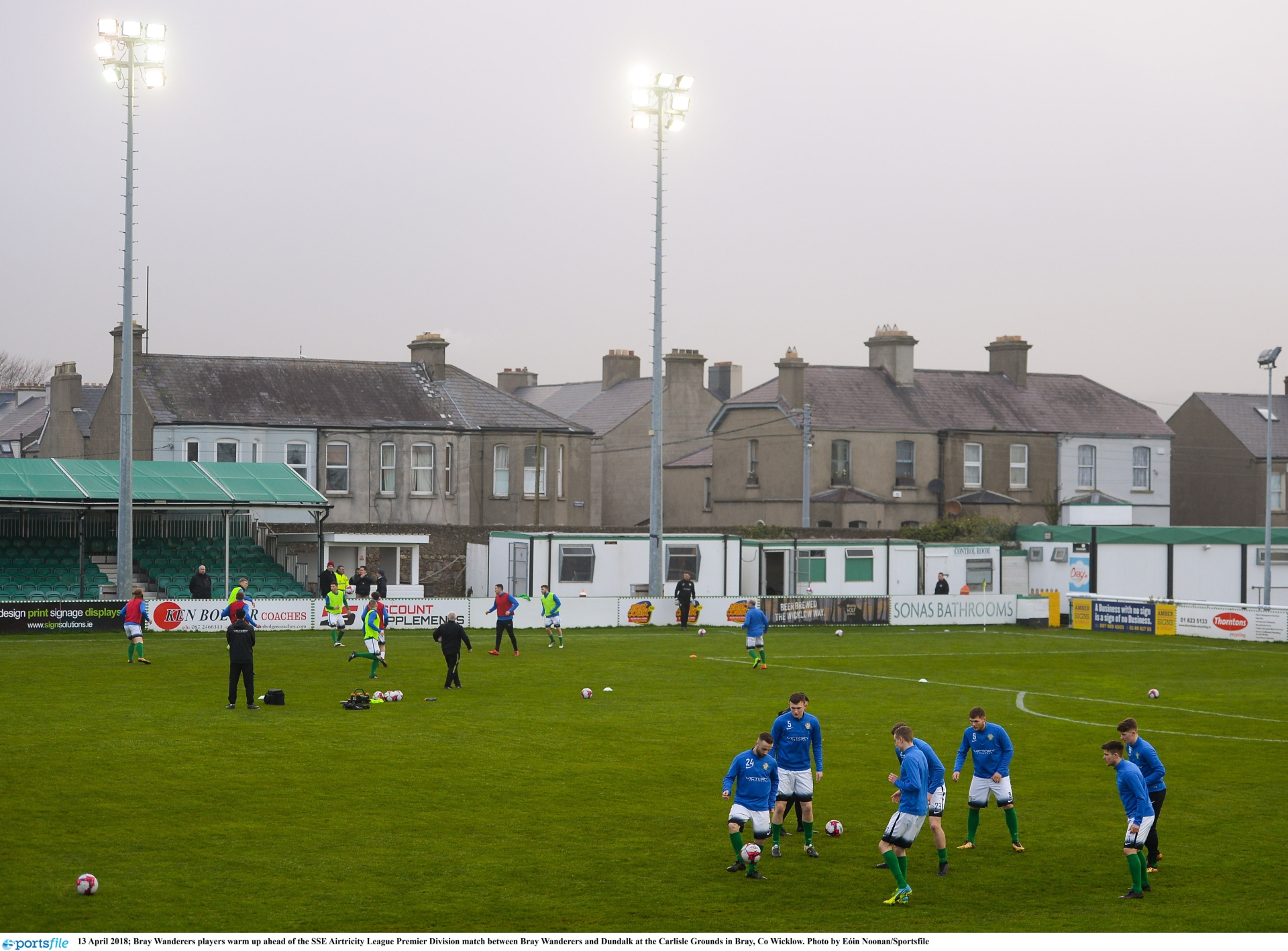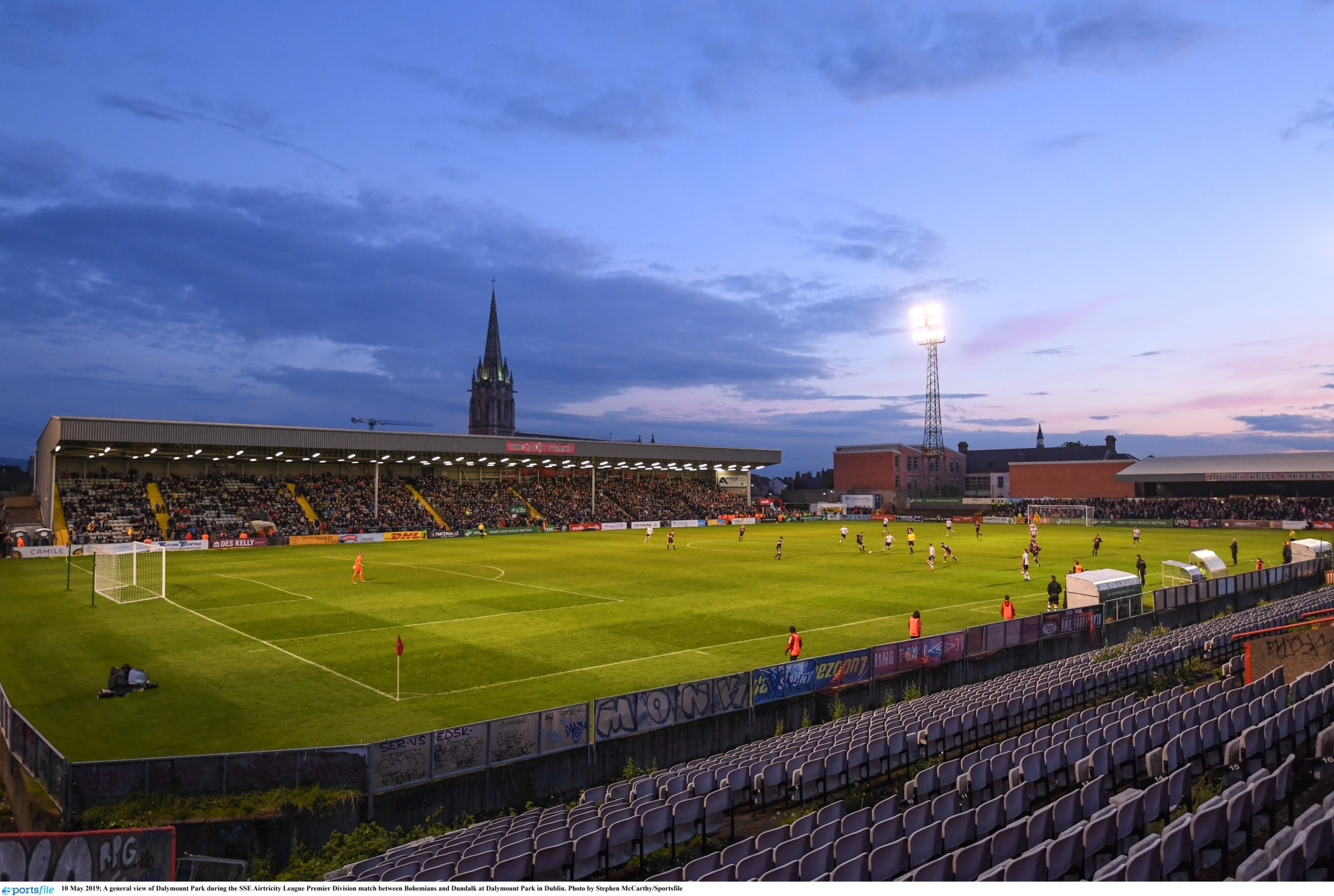
The away section at Oriel Park has been a target for criticism among League of Ireland followers and commentators alike. (Pic: Sportsfile)
There is no silver bullet for the League of Ireland, but the latest proposal of a three-tier system starting in 2021 is a case of shooting yourself in the foot to limp to the next inevitable crossroads in the not-so-distant future.
The definition of insanity is doing the same thing over and over again and expecting a different result. Pointless restructures have been a common occurrence, but this one – of which details still remain vague – may well be the craziest of the lot. Twenty clubs; 10 in the Premier Division and 10 in the First Division.
The top six to split away after the first 18 games, leaving the bottom four in the Premier to face the top four in the First, and the remaining bottom half-dozen in the lower tier to scrap it out – all facing each other home and away. How exactly the middle tier would work is a mystery for now.
Scheduling has been a constant complaint of all clubs – the successful and unsuccessful – over the past couple of seasons, but the new format, with the details currently to hand, suggests a league campaign of just 28 games for the top six; 32 for the middle eight and 28 for the bottom group.
 Finn Park, Ballybofey. (Pic: Sportsfile)
Finn Park, Ballybofey. (Pic: Sportsfile)
Dundalk will, of course, expect to be in the top tier, but only 14 league games at Oriel Park raises questions in itself – down four gate receipts from the current set-up.
Some will say you are only losing the visits of some unattractive opposition and Monday night matches if the league keeps its current 37-week programme. However, this season it would have included losing a gate against Cork City, which brought 2,837 people in.
Next season, will there be any really unattractive games at all? Shelbourne have come in for UCD and Drogheda United might soon replace Finn Harps. You’re looking at 18 home fixtures; two each against Shamrock Rovers, Bohemians, Derry City, St. Patrick’s Athletic, Sligo Rovers, Waterford, Cork, Shels and possibly the return of the Louth Derby. All decent games.
By its conclusion, Dundalk will have played 55 competitive games in 2019 – 36 League, five FAI Cup, four League Cup, six European, one Leinster Senior Cup, one President’s Cup and the two-legged Unite the Union Cup. A point to make at this stage, the Leinster Senior Cup, given its ridiculous scheduling, needs to be binned.
If Dundalk were to enjoy such success again next year then they may well be happy only facing 28 league outings, given their complaints about the heavy schedule this time around.
 United Park, Drogheda. (Pic: Sportsfile)
United Park, Drogheda. (Pic: Sportsfile)
However, they should be able to play 36 league games without such fuss. There is a much more straight-forward solution in easing fixture congestion – push the league programme out by just three weeks, from 37 to 40.
There is nothing wrong with two 10-team divisions except for the fact that you play each team four times, but such is the size of the league here. A 12-team top-flight played across three rounds is unbalanced and therefore unfair.
Five, and possibly six, of the 10 places in the Premier Division count for something at the end of the year – three, possibly four, teams qualifying for Europe, one in a relegation play-off and one demoted automatically. Some in the middle may be left playing for nothing in the closing weeks of the season, but such is football.
The First Division needs to return to four rounds of fixtures, leaving 36 series, instead of the unfair and short 27 matches of the past season.
For example, Bray Wanderers finished fifth, in the end only five points off second. Under new proposals, such a team could find themselves in the bottom tier for their final 10 games with nothing to play for, scrapping it out with the likes of Wexford – who won only two games all year.
 Carlisle Grounds, Bray. (Pic: Sportsfile)
Carlisle Grounds, Bray. (Pic: Sportsfile)
First Division clubs had been crying in previous seasons that most of them had little to play for from a long way out, which brought about this new play-off system which punishes the second-placed team. Drogheda will be four weeks without a game before they face Cabinteely, who finished fourth, in their promotion semi-final this week. That is crazy in anyone’s eyes.
If the bottom five clubs in the First Division, probably too far off to make the top two, believe it would make more financial sense to bow out after three rounds – with matchday 27 coming on Friday, September 18 – that could be accommodated.
The top five could play each other home and away, giving them a 35-game season, with the champions promoted and the second-placed team facing a play-off with second-from-bottom in the top tier (on November 23 and 27). The one issue there is they would end up playing each other five times in the season – not ideal.
Certainly, the Premier Division and First Division should run alongside each other. More should be made of the President’s Cup as the season’s curtain-raiser. The clubs involved don’t even seem to value it, but it should be used as a marketing tool to gain some excitement for the start of the league.
Start the Premier Division the following weekend, on Friday, February 21, and end it on Friday, November 20, a period of 40 Fridays. Schedule the 36 league matchdays all for Fridays – home and away consecutively – and take your mid-season break the week of Friday, June 12, the start date of Euro 2020.
Use the remaining three Fridays for the first Friday in July, August and September to play the FAI Cup last 32, last 16 and last eight ties, scrapping replays even in the quarter-finals. The FAI Cup should be looked after and deserves standalone weekends, but by the semi-final stage, only four clubs remain involved. Use the first Sunday in October for both semi-finals, as has been the case before.
There has been an issue around the FAI Cup final previously, with the organisers suggesting it must be fitted in around Ireland’s November internationals in rugby. Based on recent years, their 2020 games should be completed before a possible cup final on Sunday, November 29.
 Dalymount Park, Dublin. (Pic: Sportsfile)
Dalymount Park, Dublin. (Pic: Sportsfile)
The final being played at the Aviva Stadium has brought life back to the competition and must remain as an incentive for everybody involved.
The League Cup needs something to give it an extra edge, too – increased prize money for a start. Its schedule has worked well and the four rounds up to the final should be played on the Bank Holidays in April, May, June and August. The decider, though, needs to be fairer and should return to a two-legged affair on the last two Mondays of October – the latter being a Bank Holiday.
Teams involved in Europe should be made to play their league games on the designated weekends. Whether that means moving to a Saturday or Sunday, the fixtures should go ahead regardless. Postponements with excuses of travel, etc, should not be entertained.
Certainly, Dundalk and Shamrock Rovers are well enough conditioned, looked after and have the resources to cope with any schedule. If facing another six European games in 2020, the above schedule would see The Lilywhites face a height of 13 games – possibly 12 – in 44 days between July 3 and August 16. The price of success.
International call-ups have also become an increasing problem, but to have six league games postponed this year for the Toulon Tournament was nonsense. It’s a friendly tournament and clubs ought be given the option to allow their players to go to it or not. If they allow them to go, clubs should still have to fulfil their league commitments.
This season also showed a total lack of respect to the FAI Cup when Dundalk’s quarter-final in Waterford was shunted from a Friday night to a Monday because of The Blues’ Tunnock’s Caramel Wafer Challenge Cup tie with Hearts U21s.
Bohs having to withdraw from that competition last season should have seen an end to Irish participation in it, but it really should not be considered anymore.
There is no perfect solution to scheduling and there will always be clashes you cannot avoid – internationals in particular. Euro 2020 provides an extra headache – there is a group game scheduled for Dublin on Friday, June 19 – but that picture will become clearer next month. An extra week in the mid-season break, as happened previously, needs to be avoided, though.
Sometimes, less is more, and the three-tier proposal is one that suggests some minds are working overtime to achieve a solution to a problem that really isn’t there. The league has 99 problems, but the two-tier system ain’t one. There are simple moves to making a more organised schedule.
Prize money and better facilities are needed, but require lots of cash and investment, and in the case of facilities, if we’re being honest, we’ll be looking at the same issues in five years – certainly for the majority of clubs. Marketing is something that can be tackled now, but that too takes money and, for the foreseeable, it appears clubs will have to continue to promote themselves as best they can.
The length of the off-season has long been a talking point and that is where the immediate focus should be. Last year’s off-season was 16 weeks, between the last league game of 2018 and the first of 2019. That compares to 15 weeks in the North, 11 in Scotland and 13 in Europe’s big leagues.
Ireland needs to look at the latter, a league season run across 40 weeks, with 13 weeks until the new campaign kicks off. With the above suggestion, that would give the majority of players December 2020 off (except for the champions who would quickly play out the Unite the Union Cup) and allow them to return to pre-season in early January for a Friday, February 19, start in 2021.
It’s only an idea, but, when all is said and done, this three-tier system will probably go ahead, and we’ll be back planning another new league format by 2023 when it inevitably fails.
That’s League of Ireland football – you get used to it. Something needs to change.
Subscribe or register today to discover more from DonegalLive.ie
Buy the e-paper of the Donegal Democrat, Donegal People's Press, Donegal Post and Inish Times here for instant access to Donegal's premier news titles.
Keep up with the latest news from Donegal with our daily newsletter featuring the most important stories of the day delivered to your inbox every evening at 5pm.